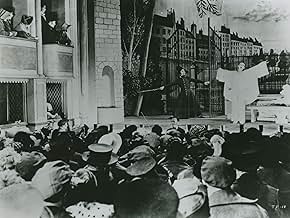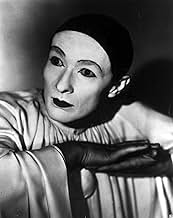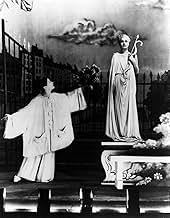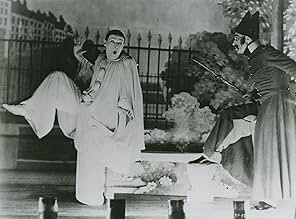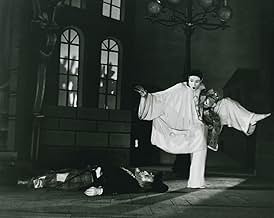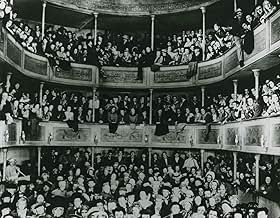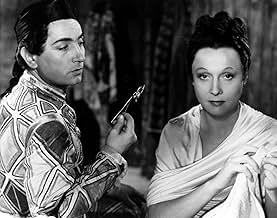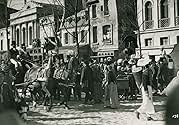CALIFICACIÓN DE IMDb
8.3/10
22 k
TU CALIFICACIÓN
La vida teatral de una bella cortesana y los cuatro hombres que la aman.La vida teatral de una bella cortesana y los cuatro hombres que la aman.La vida teatral de una bella cortesana y los cuatro hombres que la aman.
- Nominado a 1 premio Óscar
- 2 premios ganados y 1 nominación en total
María Casares
- Nathalie
- (as Maria Casarès)
Palau
- Le régisseur des Funambules
- (as Pierre Palau)
Etienne Decroux
- Anselme Debureau
- (as Étienne Decroux)
Jane Marken
- Mme Hermine
- (as Jeanne Marken)
Raymond Rognoni
- Le directeur du Grand Théâtre
- (as Rognoni)
- Dirección
- Guionista
- Todo el elenco y el equipo
- Producción, taquilla y más en IMDbPro
Argumento
¿Sabías que…?
- TriviaFilming was completed a short time before D-Day and the director, having planned to distribute the film after the liberation of France, had three copies printed and concealed in three different places: a cellar of the Banque de France, a strongbox of Pathé and a Provence country house.
- ErroresIn the outdoor market scene, the amount of food laid out on the tables varies from shot to shot. The reason is that the extras were famished from years of wartime food rationing, and stole food whenever they were not closely watched.
- Citas
Frederick: Words and phrases leave you cold. You tell your story without speaking. And you do it so well. You really astonished me. Your legs speak, your hands answer. A glance, a shrug, a step forward, back and they understand up in the Gods.
Baptiste: They understand, though they are poor. I'm like them. I love them, I know them. Their lives are small, but their dreams are vast.
- Versiones alternativasThere are various alternate cuts of this film; the complete version runs 195 minutes and has been restored on video.
- ConexionesEdited into Il était une fois...: Les enfants du paradis (2009)
Opinión destacada
Les enfants du paradis is the masterpiece of the duet Carré-Prévert. Although I did not enjoy it as much as Renoir' s work, it must be said of course that it is one of the biggest and most ambitious and most elaborate films ever made in France. Technically I was amazed by the huge sets of the beginning representing the city of Paris in the XIX century (le boulevard du Temple) and set in Nice, and the camera movements within the crowd. We have indeed to take into account the awful conditions in which the film was shot: under occupied France and in co-production with an Italian company that retired when Sicily was occupied, in the mid-shooting. (Colin Crisp) Les enfants du paradise is for me a magnificent, huge story; it is for the cinema what Balzac and Victor Hugo were for literature in the XIX century; not only French, but the world's. A colossal masterpiece with a desperately long, elaborate plot and well-defined powerful characters that confront each other trying to find out in their intercourse the answer to metaphysical questions about love and life between fantasy and reality, just as Armes suggests. Les enfants du paradis boasts an entire collection of characters that make up a twisted action as a result of the confrontation of their personal characteristics. Baptiste Deburau, a real-life mime of the XIX century is the main character. As pointed out in class, many Freudian interpretations have been made about this character: he is weak, he is unable to reach his desires (Garance), he does not want to accept the love he already has (the girl who desperately loves him), he is not a hero, but the very opposite: someone who deserves the pity of the spectator; but also that of Garance and that of his public: when he acts as a mime, the character (as usual) is always chased by fatality and sadness. He even wanted to commit sucide! Garance is a simple woman, as she says in the film. She is ambiguous. Some (the Cinemania magazine in Spain, for example) see her as a prostitute (remember the place where she used to work, her flair, or the strange character she was with and who accused her of stealing his watch -a client, a pimp?). Whatever she may be, she is a lonely woman looking for a lonely love. The four main characters of the film are in love with her, but in a different way each. Each one takes her in the way they want her to be -we see her in the arms of Lemaitre or the Count as though she was two different persons-, except for Baptiste, who at the end of the film will realize and chase his true love -although we do not know what happens at the end. Lemaitre is the man, the Don Juan, the witty, attractive and winning beloved artist. He is proud of himself and his public is proud of him. He provides some talented moments of witty puns or funny, twisted scenes -like the one in the theatre. But there are two things that he cannot obtain: absolute art, in his own opinion only Baptiste has the genius; and absolute love, Garance, who she will love but only one night. However, he can manage it all, he is a scrounger and he will still enjoy his life as it comes. Lacenaire is an ominous, dark mixture of Lemaitre and Baptiste. He is proud as Lemaitre but triumph has cheated him -he is completely awkward as a writer. And he is resentful and sad as Baptiste. These two lead him into violence against his love, Garance and against the Count -I really enjoyed the scene of the murder: the close-up and the grimace of Avril- which can also. The murder can also be taken as a rebellion of the resentful lower classes against the upper classes: the image of the fallen, dead hand with the valuable ring is significant. The count is a symbol for the upper classes: childish (his hairstyle, his expression are those of a young boy), whimsical, materialist, stuck-up, posh, he thinks he can achieve the love of Garance thanks to his influences (he saves her from the police) and wealth (notice the rich veil Garance wears at the beginning of L'homme blanc. But he will lose everything by hands of Lacenaire. Finally, I liked the character of the girl who is in love with Baptiste. She really reminds me of Éponine form Les Misérables by Hugo, the unrequited young girl in love with Marius, the main character. She wanders alone through the film, seeking the love of Baptiste, without success. And she plays the lead in one of the most bitter scenes in the film, about which we will talk later.
The main topics in the film are love on one side and life between fantasy and reality on the other. Love is always present in various forms. A passionate love by Lemaitre, a platonic love by Baptiste, an unrequited love by the girl who loves him, a love bought with money, by the Count, a violent love, by Lacenaire. But Carné and Prévert really want to show that only a true, pure and simple love will prevail. That is the love Garance seeks and that only Baptiste will be able to give her at some point. 'Love is so simple' is one of the climax phrases, containing the key of love in the movie will first pronounced by Garance and later by Baptiste. However, there are some other bitter moments on the dark side of love: at the end of the film, when Garance flees and Baptiste chases her, his wife will stand alone, in the middle of the room, still. The camera will stay with her, and we can see her reaction, that of a little child so suddenly and badly struck by betrayal. 'What about me?' So simple words that however struck me. There is in the movie a constant game between life and theatre. This has a lead role throughout both parts of the movie. We can see gorgeous and funny sketches by Baptiste (right at the beginning, when he meets Garance, and later on his performances), and burlesque or sublime representations by Lemaitre. And in general a whole bunch of characters form the theater life will show off in the movie, and theater life itself can be seen in a close-up: the owner of the theater des Funambuls, the three authors (victims of a bitter criticism and humor), the side characters. However, the climax of this close relationship between theater and life arrives in the scene where Lemaitre, who knows he can do whatever he wants on a stage, as he is a superstar, strays from the script and begins fooling around. He goes out to the stalls and then action bends over itself, and does not depend on the authors any longer: the double game actor-spectator, fiction-reality reflexes itself in a witty dance. And Lemaitre leads us in the confusion, what is real and what is not?. And that confusion is so funny for the public; and is also illicit, but Lemaitre is allowed to do anything within a theater. There is another moment where the characters of life (Garance, Lameitre and co.) long for being public again. At the beginning of the second part, Garance tells Lemaitre about the 'children of paradise', that is 'les enfants du paradis'. They are so poor, so happy, so irresponsible, up there in the cheapest seats! Just like children, as the title of the movie says. And Garance misses that, she misses that time of her life when she did not have anything to do with the Count or with the rich veil that covers her face. And the drawing from the cover of the film is meaningful too: the children of paradise sitting and watching the rest of characters, as if they were real characters in a play. And all the characters are just watching the center around which all action spins: their either beloved or hated Garance.
The main topics in the film are love on one side and life between fantasy and reality on the other. Love is always present in various forms. A passionate love by Lemaitre, a platonic love by Baptiste, an unrequited love by the girl who loves him, a love bought with money, by the Count, a violent love, by Lacenaire. But Carné and Prévert really want to show that only a true, pure and simple love will prevail. That is the love Garance seeks and that only Baptiste will be able to give her at some point. 'Love is so simple' is one of the climax phrases, containing the key of love in the movie will first pronounced by Garance and later by Baptiste. However, there are some other bitter moments on the dark side of love: at the end of the film, when Garance flees and Baptiste chases her, his wife will stand alone, in the middle of the room, still. The camera will stay with her, and we can see her reaction, that of a little child so suddenly and badly struck by betrayal. 'What about me?' So simple words that however struck me. There is in the movie a constant game between life and theatre. This has a lead role throughout both parts of the movie. We can see gorgeous and funny sketches by Baptiste (right at the beginning, when he meets Garance, and later on his performances), and burlesque or sublime representations by Lemaitre. And in general a whole bunch of characters form the theater life will show off in the movie, and theater life itself can be seen in a close-up: the owner of the theater des Funambuls, the three authors (victims of a bitter criticism and humor), the side characters. However, the climax of this close relationship between theater and life arrives in the scene where Lemaitre, who knows he can do whatever he wants on a stage, as he is a superstar, strays from the script and begins fooling around. He goes out to the stalls and then action bends over itself, and does not depend on the authors any longer: the double game actor-spectator, fiction-reality reflexes itself in a witty dance. And Lemaitre leads us in the confusion, what is real and what is not?. And that confusion is so funny for the public; and is also illicit, but Lemaitre is allowed to do anything within a theater. There is another moment where the characters of life (Garance, Lameitre and co.) long for being public again. At the beginning of the second part, Garance tells Lemaitre about the 'children of paradise', that is 'les enfants du paradis'. They are so poor, so happy, so irresponsible, up there in the cheapest seats! Just like children, as the title of the movie says. And Garance misses that, she misses that time of her life when she did not have anything to do with the Count or with the rich veil that covers her face. And the drawing from the cover of the film is meaningful too: the children of paradise sitting and watching the rest of characters, as if they were real characters in a play. And all the characters are just watching the center around which all action spins: their either beloved or hated Garance.
- miguel_marques
- 14 dic 2000
- Enlace permanente
Selecciones populares
Inicia sesión para calificar y agrega a la lista de videos para obtener recomendaciones personalizadas
- How long is Children of Paradise?Con tecnología de Alexa
Detalles
Taquilla
- Total en EE. UU. y Canadá
- USD 36,986
- Fin de semana de estreno en EE. UU. y Canadá
- USD 10,741
- 11 mar 2012
- Total a nivel mundial
- USD 44,906
- Tiempo de ejecución3 horas 9 minutos
- Color
- Mezcla de sonido
- Relación de aspecto
- 1.37 : 1
Contribuir a esta página
Sugiere una edición o agrega el contenido que falta

Principales brechas de datos
By what name was Los hijos del paraíso (1945) officially released in India in Hindi?
Responda


